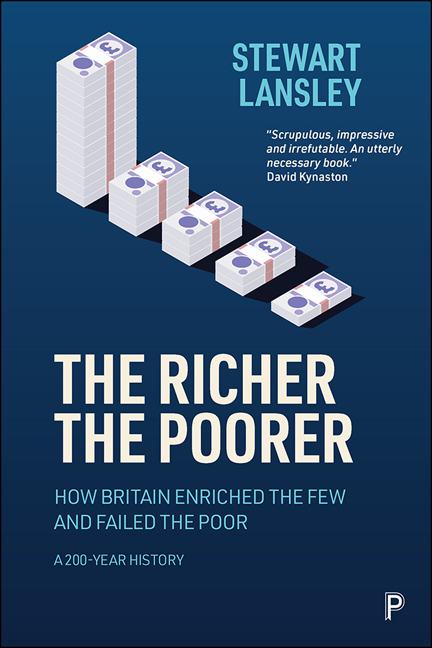Book contents
- Frontmatter
- Miscellaneous Frontmatter
- Dedication
- Epigraph
- Contents
- List of figures
- Preface and acknowledgements
- Introduction: Knighthoods for the rich, penalties for the poor
- PART I 1800–1939
- PART II 1940–59
- PART III 1960–79
- PART IV 1980–96
- PART V 1997–2010
- PART VI 2011–20
- Afterword: COVID-19 and ‘the polo season’
- Notes
- Index
- Frontmatter
- Miscellaneous Frontmatter
- Dedication
- Epigraph
- Contents
- List of figures
- Preface and acknowledgements
- Introduction: Knighthoods for the rich, penalties for the poor
- PART I 1800–1939
- PART II 1940–59
- PART III 1960–79
- PART IV 1980–96
- PART V 1997–2010
- PART VI 2011–20
- Afterword: COVID-19 and ‘the polo season’
- Notes
- Index
Summary
In 1986, the main official series on low-income trends, the biennial Low Income Statistics, was scrapped, and for the government, the uncomfortable head-count figures with it. They were replaced two years later by a new annual series, Households Below Average Incomes (HBAI). The hope was that this new series would defuse some of the pressure on the government's record. As one of the civil servants working on the changes explained in an internal memo, ‘The government shifted the basis of the “poverty” debate onto grounds of their choosing’ and ‘took away the poverty lobby's favourite propaganda instrument.’
Poverty in paradise
This was optimistic. The new HBAI series introduced a new concept of low income –those falling below various fixed proportions –from 50 to 90 per cent –of mean household income (the mean is the average income calculated by dividing the sum of all incomes by the number of people in the distribution). The first issue gave trends for both an absolute measure –based on a 1981 income threshold held constant in real terms –and several relative thresholds. Only too aware of the views of their political masters, officials were careful to tread carefully in what was a political minefield. The new series offered no judgement on which if any of the thresholds was favoured, and like its predecessor, avoided the word poverty. Ministers judged that it was better to continue to fudge the issue by sheltering behind the ‘low-income’ label. By the end of the 1980s, after a century and more of heated debate, there was still no official resolution of the thorny issue of what constituted poverty, or how to count it.
Despite the hostility to the use of contemporary standards, the new series was the first time that officialdom had used explicit ‘relative’ measures. Outside of Whitehall, among the small group of academics and activists watching these issues closely, this was a significant moment. The first set of published findings seemed to support the government in its claims. They suggested that the living standards of the poorest tenth had risen at twice the rate of the average household. Doubting these figures, which contradicted the wider evidence, the House of Commons Select Committee on Social Services commissioned the Institute of Fiscal Studies to check the findings.
- Type
- Chapter
- Information
- The Richer, the PoorerHow Britain Enriched the Few and Failed the Poor: A 200-Year History, pp. 144 - 151Publisher: Bristol University PressPrint publication year: 2021



